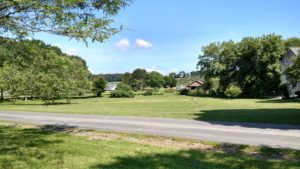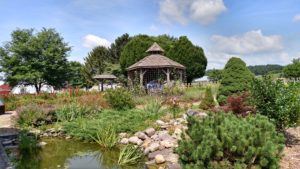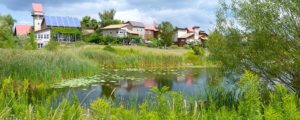We’ve recently been investigating the idea of working with an existing farmer to build an eco-community on their farm — both to help operate the farm and to consume some part of its production. This is likely contrary to most current zoning laws, but we think it’s a preferable solution to urban sprawl, and has benefits which may make it a model for future home developments. For one, it helps the farmer to have both customers and helpers onsite; and for the residents it provides healthy living in an organic environment.
We see this as a logical next step for a farm with a CSA (Community-Supported Agriculture) program; for older farmers willing to mentor and support younger ones; and for those farmers who want to increase the bio-intensity and organic productivity of their land.
We recently visited the Rodale Institute, one of the founding institutions of organic farming in America, and while the clusters of buildings are not mostly residences they could well be, for the benefit of the land and the residents as well.
The community we’re talking about in most cases would of course likely be a small one, depending on the size of the farm. For a small property it could be a single cohousing neighborhood of as few as 15-20 households; for a larger acreage it might be appropriate to build several cohousing clusters of 35 homes. The intention would be to have both these communities and the farm become more sustainable, resilient, and self-sufficient — ultimately positive contributors to society through rainwater collection, carbon farming, onsite energy generation and storage, high-yield organic produce, and so on.
Another example would be the Ecovillage at Ithaca, because although this did not start as a farm community, a portion of the property is devoted to organic production; and visually it suggests what’s possible in an agricultural environment.
Of course, not all of us want to live in a rural or semi-rural community; and indeed some of our members are opposed to building in areas that are not already developed for housing, such as distressed urban neighborhoods, small towns that could accommodate larger densities, and so on. Their objection is that this is more “green field” development that has to put in new infrastructure and potentially increases car and truck traffic in our increasingly endangered rural areas.
While this may be true, the intention is similar to that of ecovillages everywhere, which is to provide models of sustainable community living. And a well-designed farm-based eco-community can actually demonstrate a regenerative cohousing model as well as an urban revitalization can. For one thing, the goal would be a zero-waste community, i.e., a community that handles all of its own wastes internally and converts them, through natural processes such as constructed wetlands, into clean water and more fertile soil.
We recently worked on a possible project in Morris County, but it seems clear that the property is not optimal, and presents some challenges we have not been able to overcome — not least of which is the lack of capital with which to undertake any sort of development. A few of us recently agreed to form a cooperative to pool some of our capital, but even this will not be sufficient until many more step forward to play a role. (If you’re interested, contact us at evnj -at- ecovillagenj.org.)



